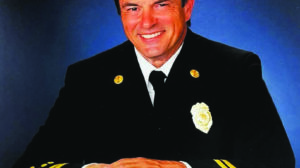Peter M. Klismet Jr. has a kind of ìguy next doorî demeanor. He doesnít wear ostentatious clothing or drive a fancy car or tout his 30 years in law enforcement as a FBI agent, who was also among the first agents trained in criminal profiling.Since he retired from the FBI, Klismet has taught criminal justice courses at Pikes Peak Community College and started his own consulting and training business, Criminal Profiling Associates LLC. He has just added another bullet point to his resume: author.ìFBI Diary: Profile of Evil,î Klismetís first published book, is an insiderís look at what profiling is (and what itís not), what it takes to be a profiler; and several high-profile cases he was involved with, where profiling helped secure arrests and convictions. He doesnít dish out overly gory details of the murders and other crimes he investigated, but the information he shares about the things humans do to one another can be sobering.ìThe New Falcon Heraldî caught up with Klismet, who lives on the northeast area of Colorado Springs, the day after his radio interview with a Portland, Ore., radio station. In the Portland interview he offered what opinion he could about the Washington Naval Yard shootings, which was only in the third day of the investigation at the time.Requests for psychological insights are an occupational hazard for Klismet. ìAfter these types of big events, like Boston and Sandy Hook; I start getting telephone calls from radio stations and sometimes from newspapers.î He has gained notoriety in Canada. ìThey seem to be a big fan of me and what I have to say, for some odd reason. I think that was because I was a consultant on, and pretty extensively quoted, in a book that was done up there about a serial killer.îIn 1985, the FBI tapped Klismet, then an agent working out of the Cedar Rapids, Iowa, Resident Agency, to attend training at the FBI Academy in Quantico, Va., for the new Psychological Profiling program. At the time, behavioral profiling was in its infancy. Klismet and his classmates were the first agents to go through the program, taught by members of the FBIís Behavioral Science Unit.Profiling was a ìcontroversial and revolutionaryî investigative technique, a way of examining crimes and criminals from a perspective unfamiliar to law enforcement officers, Klismet said. Traditional police training placed the question of ìwhyî a crime happened after who, what, when, where and how, he said. In criminal profiling, ìwhyî is at the top of the list because understanding motive is the key to identifying potential suspects, Klismet added.On his website, Klismet described criminal profiling as ìa behavioral and investigative tool which is intended to help investigators identify characteristics of unknown criminal offenders.î He said good profiling doesnít involve magic or psychic abilities. It is simply paying attention to subtle psychological and behavioral clues. ìIt really helps to be pretty sharp and a good investigator,î he said. ìItís even more valuable to have had the training and the experience.î The profiling training comes from more than 35 years of research, he said.Klismet added profiling to his regular investigative responsibilities. He was the profiling coordinator for the FBIís Omaha Division and worked with other agencies in the Midwest on violent crime cases. He also trained hundreds of law enforcement officers in psychological profiling.When people meet Klismet and learn of his FBI and profiling background, the question they most often ask is, ìWhat is the most interesting or crazy case youíve ever been involved with?îKlismet cited a murder case that has been called ìthe greatest miscarriage of justice in the United States,î in which six people were convicted for a murder they didnít commit. Klismet had developed a profile that identified the killer as a young man working alone. ìThey (local law enforcement) really discounted the profile, and the case went cold,î he said. Several years later, the case was resurrected; and, through a series of investigative and legal missteps, six individuals were tried and ended up serving almost 70 years combined in prison, he said. More than 20 years later, the facts of the case were re-examined, and DNA from the original case was tested. ìThe DNA matched a guy who almost exactly matched the profile that I had done,î he said. ìIt was the strangest case that has ever happened to me or that Iíve ever heard of in 30 years of law enforcement or 13 years of teaching criminal justice classes.îAnother question Klismet often fields is, ìHow do TV shows like ìCriminal Mindsî compare to real life?î He said that while ìCriminal Mindsî is good entertainment, it is not an accurate portrayal of what profilers do or the resources they have to work with. ìI never had a Lear jet available to me,î Klismet said. ìI didnít have an analyst who could hack into video cameras in New York, compare that to the DNA of a border collie in Montana; and then cross-match that with the location of a saguaro cactus in Arizona ñ and through that process identify a suspect.î He said the way the fictional team takes over an investigation in a particular geographic area isnít ìrealistic,î nor is developing a profile on just a few tidbits of information.Klismet said a love of writing and his own ìDNAî spawned the book idea.ìIíve always liked to write, even back in elementary school,î he said. ìItís in my DNA. My mom was a good writer; my dad was a good writer.î For Klismet, writing a book seemed like a good way to match a love of writing with his years of experience, memories of interesting cases and copious amounts of notes. He is planning to turn ìFBI Diaryî into a series, and is currently working on a book about the 1998 manhunt for three men accused of fatally shooting a deputy sheriff and wounding two others in southwestern Colorado.When asked about delving into the world of fiction writing, Klismet said, ìI donít have to write fiction, because some of the things Iíve been involved with in 30 years of law enforcement are stranger than fiction.îMoving through different phases in his life is seemingly smooth, he said. ìEvery time I turn a page, the next page has been better than before.î






